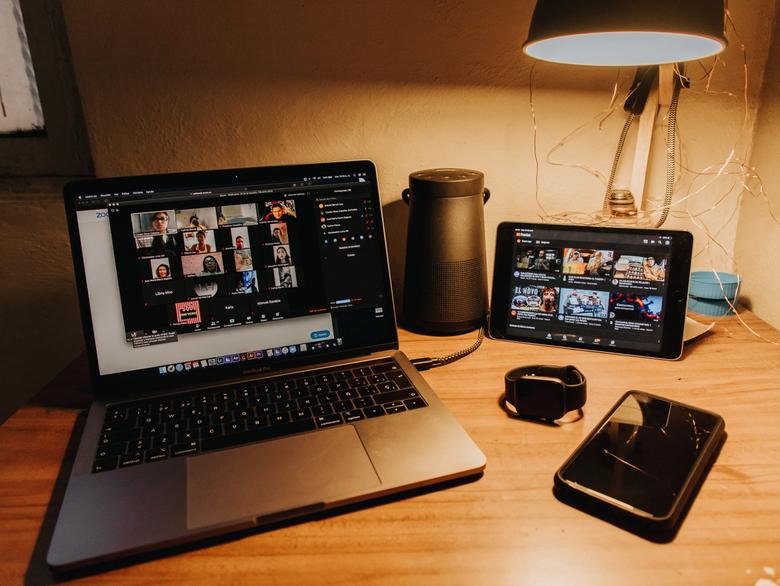7 Proven Signs Your Video Interview Is Going Well
All interviews have gone remote. How do you know if you're doing well?
It's no secret that the hiring process is different than it was 2 years ago.
With Covid changing the way we approach work, Skype, Hangout, Zoom, and Google Teams are now the predominant platforms for interviews. These digital interviews make it more difficult to determine whether a job offer might be within your reach.
But we have good news for you: we're here to help while digital interviews stick around! We're breaking down 7 signs that a job offer is coming your way, whether you're in the company's office or on their screen.

1. They sell you on the company
During most interviews, candidates spend their time marketing themselves to a prospective employer. However, if the tables suddenly turn and your interviewer starts talking about company culture, perks, or positive memories of working there, they're probably interested in you.
By discussing all the great things about the company, they're hoping to:
- Gauge your reactions to the things they say (i.e. does the company excite you?); and
- Make themselves a more compelling choice -- they understand that if you're a strong candidate, you'll likely have other job interviews or offers.
Selling you on the company is a positive sign that your interviewer wants you to move forward in the process. They wouldn't take the time to show off if they didn't like you!
2. They develop a personal connection
Any good interviewer will show genuine interest in you and your background, but sometimes, it doesn't go beyond that. Interview questions may remain strictly professional and experience-focused, and depending on the company, that may be fine. However, it's always a great sign if the hiring manager digs a little deeper.
The interview process may start to feel more casual and the interviewer may ask about your personal goals, interests, or what you do in your spare time.
Personal questions often mean that an interviewer is confident in your ability to do the job, and is moving on to assessing cultural fit. Casual conversations like this often give job seekers a good gut feeling-- and it's probably correct!
Don't Forget: On rare occasions, the questions get a little too personal...trust your gut on this one too, and know that you may not be obligated to answer. Know which questions employers aren't allowed to ask before going into an interview.

3. They build familiarity with employees and environment
In an office setting, this manifests in pretty obvious ways. Maybe the interviewer takes you on an unexpected office tour, or asks if you have a moment to meet a few of their colleagues. If you have the time, say yes-- these are good indicators that they like you and want to get other opinions before they make a final decision.
It's also another way to assess cultural fit-- do you just get along with the interviewer, or do you fit in with other employees?
In the virtual hiring environment we face today, this may look a little different. In most cases, physical office tours are out of the question. However, interviewers still may ask you to chat with colleagues digitally. Oftentimes, they will set up a same or next day meeting with folks whose opinions they need. Even though a virtual chat may feel less formal, it's important to be just as alert, interested, and personable as you would be face-to-face. Your conversations will likely impact the hiring decision!
Bonus: If the interview runs over time because of these tours, extra conversations, or just because you're having a good time, the odds are in your favor!
4. They have the right body language
Pay close attention to an interviewer's facial expressions and body language. Whether you're in person or over the screen, facial expressions should be easy to gauge-- if they're engaged in the conversation, smiling often, or expressing other signs of approval, they probably like what they hear.
If you're more experienced in reading people, pay attention to positive microexpressions they subconsciously exhibit.
Body language is a bit more difficult to see on a screen, but thoughtful nods and a relaxed posture are generally good signs. If the interviewer seems at ease and happy when they engage with you, you're more likely to be a strong contender.

5. They talk like you're already hired
When a hiring manager knows they've met the right person for the job, their language usually shows it. They may use terminology that implies you have a future at the company, like saying "when you start" instead of "if you start", or "you will" instead of "you would".
They may also ask about your desired start date, or tell you when they need the position filled by. Employers only speak this way to interviewees they can envision at the company. They don't want to provide false hope, or give candidates with little potential a reason to follow up about a start date.
If you're interested in the company, make sure to show that you're just as excited about them as they are about you. Be enthusiastic and receptive to their future-focused language.
Bonus: If they ask you to come in for final rounds on the spot, or (even more rarely) offer you the job then and there, they're (very) obviously interested!
6. They ask to run a background or reference check
Reference and background checks are often some of the last steps in the hiring process. Companies won't waste time or money running these on candidates they aren't serious about.
Some organizations won't let you know they're making these inquiries, but those who do want to:
- Be open and honest with you about their process, and
- Give you a hint that you're among the finalists for the position.
Congratulations-- there's a chance you'll receive a job offer soon!
👉 If you do receive a job offer, how should you respond? Find out here.

7. They start talking salary and benefits
At the end of the interview (or shortly after), it's unlikely that you'll receive a formal offer. However, a recruiter or hiring manager may start talking about compensation.
They may ask what you're receiving at your current job (though this is illegal in many states), what you hope to make at this one, or they may directly provide you with numbers. Although these scenarios often indicate the company's interest, they can also turn sticky very easily.
For the best tips on how to navigate these conversations, check out our salary negotiation guide.
The information provided herein is for general informational purposes only and is not intended to provide tax, legal, or investment advice and should not be construed as an offer to sell, a solicitation of an offer to buy, or a recommendation of any security by Candor, its employees and affiliates, or any third-party. Any expressions of opinion or assumptions are for illustrative purposes only and are subject to change without notice. Past performance is not a guarantee of future results and the opinions presented herein should not be viewed as an indicator of future performance. Investing in securities involves risk. Loss of principal is possible.
Third-party data has been obtained from sources we believe to be reliable; however, its accuracy, completeness, or reliability cannot be guaranteed. Candor does not receive compensation to promote or discuss any particular Company; however, Candor, its employees and affiliates, and/or its clients may hold positions in securities of the Companies discussed.
